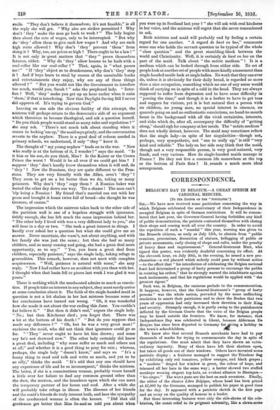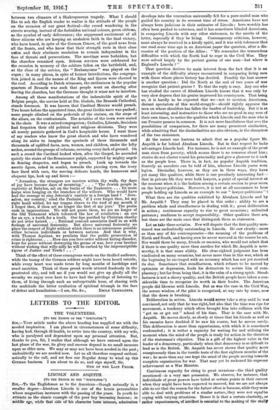CORRESPONDENCE.
BELGIUM'S DAY IN BELGIUM.—A GREAT SPEECH BY CARDINAL MERCIER.
(To THE EDITOR OH THE " SPECTATOR."]
Sis,—We have now received some particulars concerning the way in which Belgians celebrated the anniversary of their Independence in occupied Belgium in spite of German restrictions. It will be remem- bered that last year, the Governor-General having forbidden any kind of public demonstration, the patriots contented themselves with closing their shops and ceasing work all over the country. In order to avoid the repetition of such a " scandal " this year, warning was given to the Brussels citizens, as early as July 12th, to abstain from " public reunions, processions, decoration of statues, beflagging of public or private monuments, early closing of shops and cafés, under the penalty of heavy fines and imprisonment." General-lieutenant Hurt, who signed this poster, was evidently doubtful concerning its effect. At the eleventh hour, on July 20th, in the evening, he issued a new pro- clamation—a red placard which nobody could pass by without notice —to the effect that " his interdiction of celebrating the Belgian national feast had determined a group of hasty persons to encourage the public, in resisting his orders," that he strongly warned the inhabitants against such incitements, and that his regulations would be applied with " the greatest rigour."
Such was, in Belgium, the ominous prelude to the commemoration. It happens, however, that the General-lieutenant's " group of hasty persons " was the whole nation, pervaded by the same unflinching resolution to assert their patriotism and to show the Boches that two years of oppression had only increased their devotion to their King and country. Strangely enough, it is partly owing to the punishments inflicted by the German Courts that the voice of the Belgian people may be heard outside the frontiers. We know, for instance, that Independence Day was celebrated in Ghent, because Alderman De Bruyne has since been deported to Germany forgiving a holiday to the town's schoolchildren.
We know also that several Brussels merchants have had to pay thousands of marks for trying to commemorate the day in spite of the regulations. One must admit that they have shown an extra- ordinary ingenuity. Many of them have left their shutters open, but taken all goods out of their windows. Others have invented some patriotic display : a fruiterer managed to suggest the Tricolour flag by exhibiting only red tomatoes, yellow oranges, and black grapes ; a " modiste " draped her window in green, the colour of hope, and trimmed all her hats in the same way ; a hatter showed two stuffed monkeys wearing elegant top-hats, an evident allusion to Bissingen- " bis-singes." The worst puns are the best on such occasions. Finally, the editor of the elusive Libre Belgique, whose head has been priced at. £2,800 by the Germans, managed to publish his paper in good time for the day. It appeared with a patriotic sketch in the first page and an essay on the quality of honour in a leader.
But these interesting features were only the side-shows of the cele- bration, the comic relief to its poignant solemnity, like a clown-scene
between two climaxes of a Shakespearean tragedy. What I should like to ask the English reader to realize is the attitude of the people on the occasion of our great festival—the crowd wandering in the streets wearing, instead of the forbidden national colours, green ribbons, as the symbol of early deliverance ; the suppressed excitement of all these citizens who are keeping an unshaken faith in the final victory, who have heard, in spite of the German Censor, of the good news from all the fronts, and who know that their strength rests in their close union and their obstinate resolution to remain independent in the face of threats; and persecutions. The meetings were forbidden, but the churches remained open. Solemn services were celebrated for the occasion in memory of the soldiers fallen on the battlefield, and, at the close of the service, the " Brabanconne " was played on the organ ; in many places, in spite of former interdictions, the congrega- tion joined in and the names of the King and Queen were cheered to the roof. According to Dutch witnesses, the enthusiasm in the popular - quarters of Brussels was such that people went on cheering after leaving the churches, but the Germans thought it wiser not to interfere.
Among all these manifestations of the indomitable spirit of the Belgian people, the service held at Ste. Gudule, the Brussels Cathedral, stands foremost. It was known that Cardinal Mercier would preach. Two hours before the appointed time, the great Gothic nave was packed; some people climbed on the pedestals of the statues, on the steps of the altars, on the confessionals. The notables of the town were seated in the choir. It was a mixed congregation; Catholics, Liberals, Socialists had forgotten their old political and religious divisions. They were all merely patriots gathered in God's hospitable house. I want those of my readers who know the great church and who have wandered along its aisles to imagine the spectacle of these thousands and thousands of uplifted faces, men, women, and children, under the lofty arches, around the groups of columns, covering every inch of ground. On such a crowd the Cardinal looked when, after the Gospel, he ascended quietly the stairs of the Renaissance pulpit, supported by mighty angels in floating draperies, and began to preach. Look up towards the ascetic figure, robed in scarlet, towards the piercing eyes, the ivory face lined with care, the moving delicate hands, the humorous and eloquent lips, look up and listen :—
" Jerusalem, the" strangers are masters within thy walls, thy days of joy have become days of mourning." . . . " The Jewish people in captivity at Babylon, sat on the banks of the Euphrates. . . . Its mute 'harps wore hanging on the branches of the willows. Who would have had the courage to sing Jehovah's canticle in a foreign land ? ' Jeru- salem, my country,' cried the Psalmist, ' if I ever forget thee, let my right hand wither, let my tongue cleave to the roof of my mouth if I forgot thee, if thou art no longer the first of my joys.' The psalm ends in imprecations. We will not quote them, we are no longer of the Old Testament which tolerated the law of retaliation : an eye for an eye, a tooth for a tooth. Our lips purified by Christian charity do not utter hatred. . . . National concord associates itself in us with feelings of universal fraternity. But above universal fraternity we place the respect of Right without which there is no intercourse possible either between individuals or between nations. And that is why, with Thomas Aquinas, we proclaim that the public prosecution of crime is righteous.. . . How can you love order without hating disorder, hope for peace without destroying the germs of war, love your brother without wishing that willy-nilly he will be curbed by the imprescriptible rigour of Justice and Truth ? . . ."
Think of the effect of these courageous words on the thrilled audience, while the tramp of the German soldiers might have been heard outside, while every heart was made tense by long months of hardships and cruel anxieties. Think of these proud words uttered fearlessly in the prostrated city, and tell me if you would not give up gladly all the security we enjoy over here to have had the privilege of listening to them, of living through such an unforgettable hour, of sharing with the multitude the bitter exultation of spiritual triumph in the face
of defeat and humiliation.—I am, Sir, &c., ERHLE CAILMAERTS.































 Previous page
Previous page